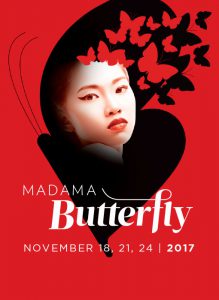Love and Betrayal
Synopsis
The world’s most beloved opera is the intensely moving story of a devoted young Japanese woman who is loved and betrayed by an American naval officer.
Puccini’s glorious music embodies all the passion and heartbreak of this timeless story of a doomed romance. A deeply emotional experience.
Set in Japan at the dawn of the 20th century, East meets West in this clash of values and traditions.
Music
Giacomo Puccini
Libretto
Luigi Illica and Giuseppe Giacosa
Performed at the Centennial Concert Hall.
Sung in Italian with projected English translations
ACT I.
Lieutenant Pinkerton of the U.S. Navy inspects a house overlooking Nagasaki harbor that he is leasing from Goro, a marriage broker. The house comes with three servants and a geisha wife known as Madam Butterfly (Cio-Cio-San). The American consul Sharpless arrives breathless from climbing the hill. Pinkerton describes his philosophy of the fearless Yankee roaming the world in search of experience and pleasure “Dovunque al mondo.” He is not sure whether his feelings for the young girl are love or a whim, but he intends to go through with the marriage ceremony anyway. Sharpless warns him that the girl’s philosophy may not be as breezy as Pinkerton’s, but Pinkerton brushes off such concerns and says someday he will take a real, American wife. He offers the consul whiskey and proposes a toast, “America forever!” An eager Butterfly is heard climbing the hill with her friends for the ceremony “Spira sul mare.” In casual conversation after the formal introduction, Butterfly admits her age of fifteen and tells him how her family was once prominent, but she has more recently had to earn her living as a geisha. Her relatives arrive and chatter about the marriage. Cio-Cio-San shows Pinkerton her very few possessions, and quietly tells him she has been to the Christian mission and will embrace her husband’s religion. The Imperial Commissioner reads the marriage agreement, and the relatives congratulate the couple. Suddenly, a strident voice is heard from afar. It is the Bonze, Butterfly’s uncle, a priest. He curses the girl for going to the Christian mission and renouncing her ancestral religion. Lieutenant Pinkerton orders the Bonze and Butterfly’s shocked relatives to leave at once. Butterfly is upset, and her new husband tries to console with sweet words. She is helped by Suzuki into her wedding kimono, and joins Pinkerton in the garden “Viene la serà.”
ACT II, Part I
Three years have passed, and Cio-Cio-San still waits for her husband’s return. Suzuki prays to the gods for help, but Butterfly berates her for believing in lazy Japanese gods. She envisions the day when Pinkerton will return “Un bel di.” Sharpless appears with a letter from Pinkerton, but before he can read it to Butterfly, Goro arrives with the latest potential husband for Butterfly, the wealthy Prince Yamadori. Butterfly insists she is not available for marriage as her American husband has not deserted her. She dismisses Goro and Yamadori. Sharpless attempts to read the letter and suggests that perhaps Butterfly should reconsider Yamadori’s offer. “And this?” asks Butterfly, showing the consul her small child. Sharpless is too upset to tell her more of the letter’s contents. He leaves, promising to tell Pinkerton about the child. A cannon shot is heard in the harbor, announcing the arrival of a ship. Through a telescope, Butterfly and Suzuki read the name of Pinkerton’s ship. Overjoyed she has been proven right, Butterfly joins Suzuki in strewing the house with flower petals from the garden “Scuoti quella fronda.” Night falls, and Butterfly, Suzuki, and the child settle into a vigil over the harbor (Humming Chorus).
ACT II, Part II
Dawn breaks, and Suzuki insists that Butterfly get some sleep. Butterfly carries the child into another room. Sharpless appears with Pinkerton and Kate, Pinkerton’s new wife. Suzuki realizes who the American woman is and agrees to help break the news to Butterfly. Pinkerton is overcome with guilt and runs from the scene, pausing to remember other times in the little house “Addio, fiorito asil.” Cio-Cio-San rushes in hoping to find Pinkerton but instead sees Kate. Grasping the situation, she agrees to give up the child but insists Pinkerton return for him. Dismissing everyone, Butterfly takes out the sword with which her father had committed suicide, choosing to die with honor rather than live in shame. Suzuki sends in the child, hoping to change Butterfly’s mind, but Butterfly says goodbye to the child and blindfolds him “Tu, piccolo Iddio.” She kills herself as Pinkerton calls her name.
Courtesy of Opera News







